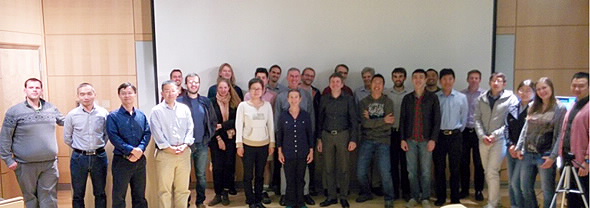
In mid-October scientists from ANSTO’s Human Heath and the University of Sydney Imaging Physics Laboratory visited the University of California Davis laboratories to meet with team of researchers from the total-body PET Explorer Consortium.
The first prototype currently being built is a revolutionary total-body PET scanner with have over 560,000 detector elements and the capacity view all organs of the body simultaneously.
The scanner will provide a 40-fold increase in effective signal over current technology to both improve image quality and reduce radiation exposure to patients. Conventional PET scanners can only image a small segment of the body at a time.
 |
The Australian teams were awarded a grant under the University of Sydney-UC Davis Priority Partnership collaboration scheme in March 2017 to contribute to the development of the scanner.
 |
“This is a very important project involving leaders in medical imaging that will dramatically improve our ability to improve cancer and other diseases diagnostic and open the use of PET to vulnerable populations such as paediatric patients,” said Leader of Human Health at ANSTO, Prof Marie Claude Gregoire.
The visit was the first collaborative workshop to discuss methodology and computational imaging in support of the EXPLORER project.
A series of technical presentations at UC Davis covered latest technology developments, the challenges associated with tracking and correcting for subject motion during imaging and methods for reconstructing the massive EXPLORER datasets.
The program included a methodology to ensure the resulting images are quantitatively correct, and to model time-series of imaging data for the extraction of specific parameters related to the transport of radiotracers, metabolism and binding.
Prof Gregoire, who is an expert in molecular imaging using nuclear techniques, delivered an invited talk on future strategies for kinetic modelling to extract biological parameters.
More than thirty participants joined the workshop held at UC Davis. It was webcast to a further 20 participants located in three different countries.
The next workshop is planned for April 2018 in Sydney
Published: 28/11/2017


